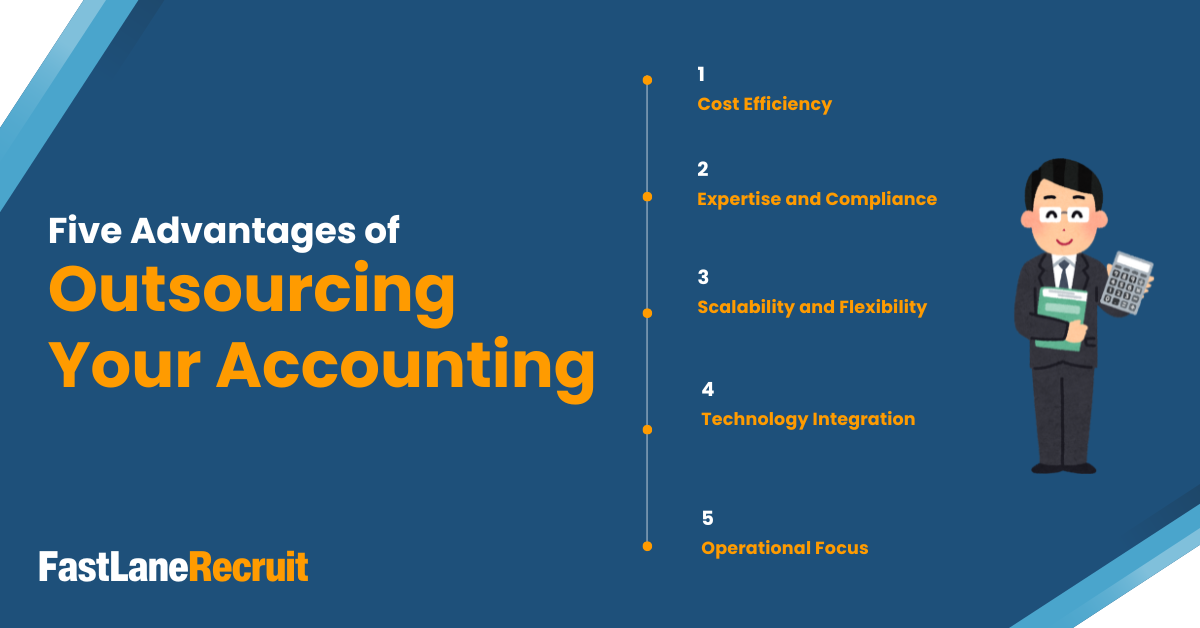Outsourced accounting has become a strategic option for many Malaysian SMEs and growing businesses, especially in today’s fast-paced, digitised environment. This model helps business owners offload time-consuming financial operations, from daily bookkeeping to year-end reporting to third-party professionals.
For companies lacking in-house expertise or looking to scale efficiently, outsourced accounting offers agility. However, it’s not without risks. Business owners must balance cost savings and access to experts with potential challenges like communication gaps and data confidentiality concerns. Understanding both the advantages and limitations will help you decide whether this model aligns with your operational needs.
Content Outline
Key Summary
Cost savings through variable pricing
Outsourcing reduces fixed overhead by converting full-time salaries and infrastructure into scalable, need-based expenses.
Access to specialised knowledge
Firms bring industry-specific expertise and up-to-date knowledge of Malaysian tax laws and financial regulations.
Reduced administrative burden
Delegating time-consuming tasks like payroll, bank reconciliations, and SST filing allows business owners to focus on core strategy.
Loss of direct control
Outsourcing may result in reduced visibility and delayed decision-making unless strong service level agreements (SLAs) are in place.
Need for data security diligence
Sharing sensitive financial information with external vendors introduces cybersecurity and compliance risks that must be proactively managed.
Best suited for growth-stage businesses
Startups and SMEs with limited resources can benefit most, while mature businesses may consider hybrid models.
Choosing the right partner is critical
The long-term value of outsourcing depends on finding a culturally aligned, transparent, and licensed accounting provider.
What is Outsourced Accounting?
Outsourced accounting refers to the delegation of financial functions, such as bookkeeping, tax compliance, financial reporting, budgeting, and payroll, to external accounting professionals or firms. These service providers can be local or offshore, and they may offer a full-suite solution or support specific processes.
In Malaysia, outsourced accounting providers must comply with local regulations, such as those governed by the Companies Commission of Malaysia (SSM) and the Malaysian Institute of Accountants (MIA). You can verify a provider’s registration through the SSM e-Search portal or ensure they’re listed as licensed chartered accountants on the MIA directory.
In practice, outsourcing firms often use cloud accounting platforms such as Xero, QuickBooks, or MYOB, which offer secure, real-time access to financial data and reports.
Also Read: Offshore Accounting: Top 10 Offshore Roles For Accounting
Five Advantages of Outsourcing Your Accounting
1. Cost Efficiency
Outsourcing is typically more affordable than hiring an in-house team. Companies can save on full-time salaries, EPF/SOCSO contributions, office space, and training costs. For small businesses, this could amount to a 30–50% reduction in administrative overheads.
2. Expertise and Compliance
Reputable outsourced firms stay current with the latest Inland Revenue Board of Malaysia (LHDN) tax updates, Sales and Service Tax (SST) changes, and Bank Negara Malaysia (BNM) financial regulations. This reduces the risk of penalties and ensures timely, compliant reporting.
3. Scalability and Flexibility
As your business grows, your accounting needs become more complex. Outsourced providers can quickly scale services to match evolving requirements whether you’re expanding into international markets or managing multi-currency transactions.
4. Technology Integration
Outsourcing firms often provide access to powerful software suites bundled with their services. These tools allow real-time access to dashboards, automate invoice processing, and streamline reconciliation tasks, tools that would be costly if implemented independently.
5. Operational Focus
With accounting responsibilities handled externally, business owners and executives can allocate more time to growth-focused activities like customer engagement, product development, and strategic planning.
Also Read: Benefits Of Offshoring Accounting In Malaysia

Five Potential Drawbacks to Consider
1. Reduced Control and Oversight
While outsourcing creates efficiency, it may reduce direct access to daily transactions. Delays in communication or a lack of visibility over financial decisions can impact your agility.
2. Data Privacy Risks
Outsourcing exposes sensitive financial and employee data to third parties. In Malaysia, businesses must comply with the Personal Data Protection Act 2010 (PDPA). Choosing a provider with strong cybersecurity protocols and ISO certifications is essential.
3. Communication Challenges
Outsourced teams, especially if offshore, may face difficulties understanding local business context or regulations. Miscommunications due to time zones, language, or culture can lead to errors or delays.
4. Hidden Costs
Low-cost packages can quickly balloon with hidden charges such as ad hoc reporting, additional payroll runs, urgent filings, or audit liaison services. Always clarify deliverables and pricing in the SLA.
5. Reliance on External Stability
A vendor’s staff turnover, acquisition, or software change can disrupt your operations. Business continuity planning is critical when engaging any long-term outsourced partner.
Also Read: The Ultimate Guide to Offshore Accounting
Outsourcing vs. Insourcing: Weighing the Options
Here is a breakdown to help Malaysian businesses evaluate both options more effectively:
| Criteria | Outsourcing | Insourcing |
| Initial Setup Cost | Low – Pay per service/use | High – Salaries, benefits, office space |
| Monthly Operational Cost | Variable – Based on scope | Fixed – Salaried staff, ongoing HR expenses |
| Compliance Management | Shared with provider; must monitor accuracy | Fully internal responsibility |
| Technology Tools | Bundled with service | Requires separate investment and updates |
| Expert Access | Multi-specialist team on-demand | Limited to hired personnel |
| Scalability | Highly scalable; upgrade anytime | Limited by recruitment and onboarding timelines |
| Data Control | Less direct control; reliant on access protocols | Full control over systems and records |
| Best for | SMEs, startups, and growth-stage businesses | Larger enterprises or companies with specific internal accounting needs |
The Path Forward: Choose a Partner, Not Just a Provider
Success in outsourcing depends not just on price, but on alignment, trust, and proactivity. Look beyond low rates and evaluate providers based on:
- Professional credentials – Are they MIA-certified? Do they follow BNM and LHDN best practices?
- Cultural fit – Do they understand local business context and industry-specific needs?
- Technology stack – Do they use secure, compliant software with real-time access?
- Governance and accountability – Do they offer periodic reporting, SLA benchmarks, and audit support?
- Proactive advisory – Do they flag tax-saving opportunities or regulatory changes, such as SST adjustments from Royal Malaysian Customs?
Consider outsourcing as a partnership for business growth, not just a transactional service.
Frequently Asked Questions about Outsourced Accounting
Q1: Is outsourcing accounting legal in Malaysia?
Yes. Outsourcing is entirely legal when performed by licensed professionals in compliance with the Companies Act 2016 and MIA by-laws.
Q2: Who is liable if there’s an accounting or tax error?
Ultimately, company directors are responsible under Section 75 of the Income Tax Act 1967. That said, reputable vendors provide indemnity clauses and are accountable for negligent actions under contract.
Q3: Can I outsource specific functions only?
Yes. Many SMEs begin by outsourcing payroll or tax submissions and gradually expand to full accounting as they build trust with the provider.
Q4: Will my auditor accept outsourced accounts?
Yes. As long as the outsourced provider maintains proper documentation, audit trails, and complies with Malaysian Financial Reporting Standards (MFRS), external auditors will work with them.
Q5: How do I check if my vendor is licensed?
Search the provider on the SSM e-Search portal and the MIA member directory to verify active certifications.
Conclusion
Outsourcing accounting can be a strategic move for Malaysian businesses aiming for growth, efficiency, and regulatory compliance. While it offers numerous benefits from cost reduction to better expertise, business owners must also weigh potential risks like data security, communication delays, and reliance on external firms. By conducting due diligence, drafting robust SLAs, and aligning values with your provider, you can leverage outsourced accounting as a tool for sustainable growth, not just operational support.
How FastLaneRecruit Can Help
At FastLaneRecruit, we empower businesses with comprehensive financial talent solutions through our offshoring and outsourcing services. Whether you’re seeking to outsource skilled Malaysian accountants, streamline your payroll operations, or build a reliable offshore accounting team, we offer flexible and cost-efficient solutions tailored to your business needs.
Our services go beyond placement, we provide end-to-end support, connecting you with professionally qualified talent who understand local and international accounting standards, tax regulations, and payroll compliance in Malaysia. From payroll outsourcing to specialised talent acquisition, we help you reduce overhead costs, maintain accuracy, and ensure regulatory compliance.
Partner with FastLaneRecruit to scale your accounting operations efficiently and strategically without compromising quality. Contact us today to start your outsourcing journey with confidence!


